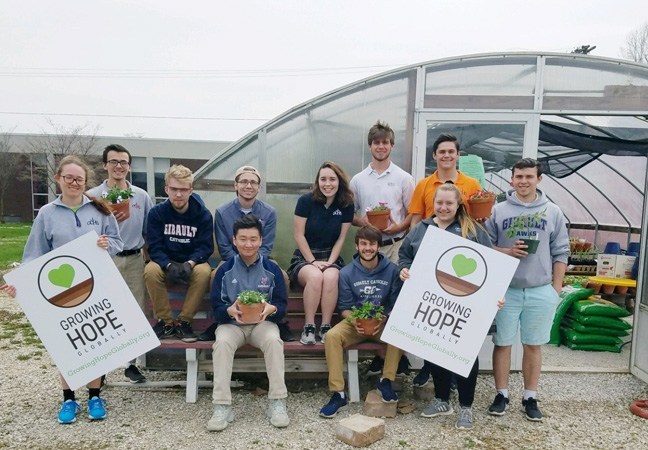
Gibault students’ farm project aids global development efforts
This article was originally published in the Messenger, the Catholic newspaper for the Diocese of Belleville, Illinois.
By Suzanne Koziatek, Staff Writer
Group will sow wheat on donated land, donate proceeds from their harvest
Students at Gibault Catholic High School in Waterloo are digging deep to help families far away, as they join forces with a non-profit that aids farmers in the developing world in improving their harvests.
The 28 students in the school’s environmental science program and Future Farmers of America club are embarking on a farming project to raise money for Growing Hope Globally. The Christian-based organization links groups in the U.S. with development organizations around the world who are helping farmers become more self-sufficient.
In a typical project, farmers here may set aside some of their land to grow crops for sale to fund activities in Africa, Asia or Central America. Those activities have included helping farmers develop new crops in response to climate change and promoting soil conservation and kitchen gardens.
At Gibault, the students plan to find land that can be donated to grow winter wheat this fall, says agriculture instructor Greg Wiegand. They’ll seek donations of seed and services, assist with farming the tract and sell the proceeds.
“We want to make it profitable, to get the most bang for their buck,” Wiegand says. “That’s their objective.”
It’s part of a push by Growing Hope Globally to partner with high school agriculture classes and Future Farmers of America clubs, says Eric Mattson, regional director for Growing Hope Globally.
“Most of our projects are agriculture-related – they’re set up as farmer-to-farmer projects,” he says. “But we’re looking to engage high school kids, to send them out into the world knowing more about this.
“This is brand-new territory for us,” Mattson says. “(Gibault’s students) are stepping out on a limb with us.”
As part of the partnership, Growing Hope Globally sends curriculum materials to the school. Students learn about the scope of hunger around the world and the ways in which organizations such as Catholic Relief Services work to alleviate it.
Wiegand says it’s been an eye-opening experience for his students over the course of the school year. “One speaker talked to them about living with 15 people, and sharing one chicken a month,” he says. “Here in this country, we sometimes talk about being hungry, but these people literally may have nothing to eat.
“Villages don’t want a handout – they want assistance in becoming self-sufficient,” he says.
Having learned the extent of the problem, the students are now focusing on solutions. They’re getting started planning their growing project, seeking out land donation opportunities, as well as learning about the best seeds for planting.
Wiegand says they hope to sell both wheat and straw from their first crop, then sow soybeans into the wheat stubble. They’ll have to figure out how to sell their crops and how to store them until the most beneficial sale time – decisions that working farmers make every day. They’re getting help from local farmers and from Gateway FS, an agricultural cooperative. He hopes to have Adam Parker, a Gibault alum and grain marketer at the cooperative, work with the kids to discuss a marketing plan.
“Kids have no idea about everything that goes into it,” he says. “It’s so much more than just hopping in the tractor and farming.”
Wiegand expects the first harvest to come in the summer of 2020. Once the crops have been sold and the money raised, students will decide which of Growing Hope Globally’s projects they’ll help fund.
“I’m trying to let them choose – we want to allow them to really take ownership of the project.”
Wiegand hopes to continue the relationship between Gibault and the organization after this first harvest.
“Potentially, they could grow other crops in future years,” he says. “We’d like each following class to keep the project going forward.
“Someday, maybe 25 or 30 years from now, I’d like for these kids to be watching the news and hearing them say that all countries of the world are self sufficient,” Wiegand says.
He also would like to see interest in the project spread well beyond the school. Anyone who wants to help by donating time, money, expertise, is encouraged to contact the school or Wiegand. Farmers in the area may allot part of their own harvests to Growing Hope Globally.
Mattson is optimistic that this venture will lead to more school partnerships.
“We see it as a stepping stone to getting more schools involved,” he says. “I don’t know if Gibault knows how excited I am about this.”
For information about helping out with Gibault’s growing project for Growing Hope Globally, contact agriculture instructor Greg Wiegand at gwiegand@gibaulthawks.com or call the school office at 618-939-3883.
For information about Growing Hope Globally, contact Eric Mattson at eric@growinghopeglobally.org.
